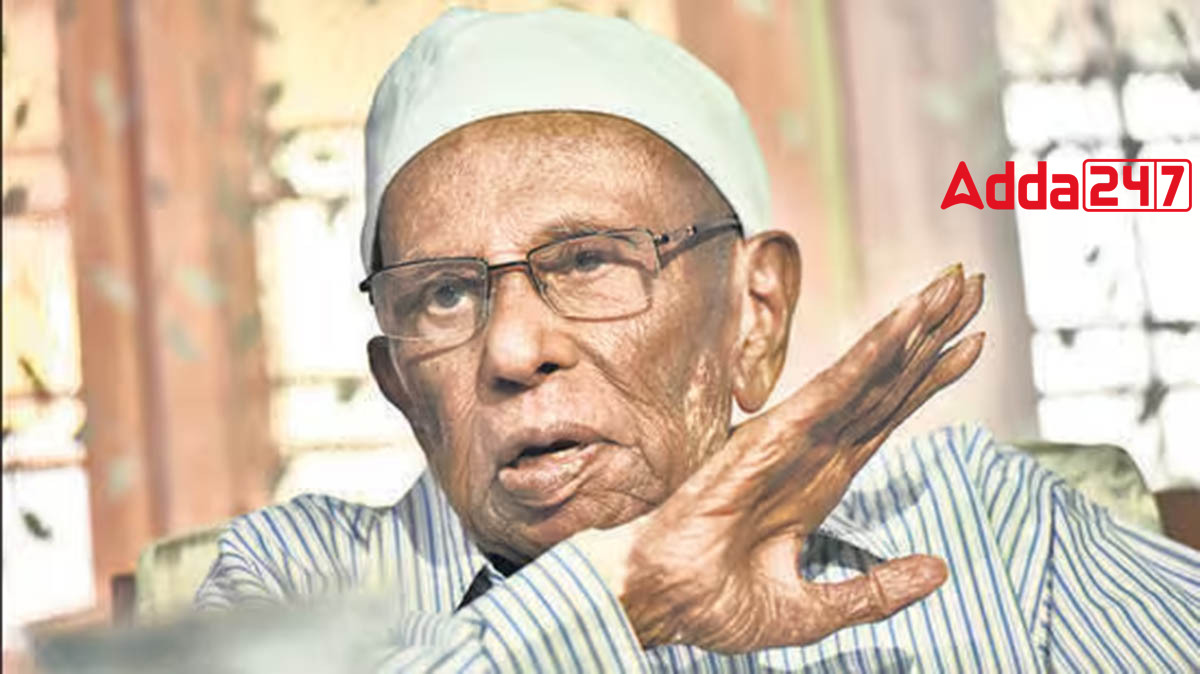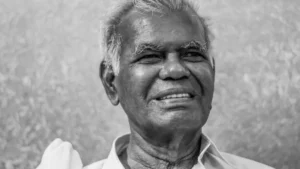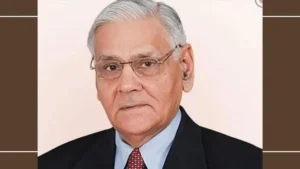Justice K.S. Puttaswamy, the pivotal petitioner in the landmark right to privacy case, passed away at the age of 98 on Monday. His passing comes over seven years after the Supreme Court ruled that privacy is a fundamental right. Born in February 1926 in Kolar, Karnataka, he had a distinguished legal career that included serving as a judge at the Karnataka High Court and later as the first vice chairperson of the Central Administrative Tribunal in Bengaluru. His significant contributions to Indian law, particularly regarding the right to privacy, will be remembered as a cornerstone in the protection of individual rights in India.
Early Life and Legal Career
Justice Puttaswamy was born in Kolar, Karnataka, and completed his education at Maharaja College in Mysuru and the Government Law College in Bengaluru. He enrolled as an advocate in 1952, gaining experience at the Mysore High Court before its renaming as the Karnataka High Court. Appointed as an Additional Government Advocate, he eventually became a judge on November 28, 1977, serving until his retirement in 1986. His post-judicial career included leadership at the Central Administrative Tribunal in Bengaluru, emphasizing his commitment to public service.
The Landmark Right to Privacy Case
In 2012, Justice Puttaswamy filed a petition against the Aadhaar scheme, challenging its constitutionality. This case took a significant turn in 2015 when the Supreme Court decided to address the broader question of whether privacy is a fundamental right under the Constitution of India. At the time, the BJP-led NDA government argued against this stance, asserting that privacy was not a fundamental right.
On August 24, 2017, a nine-judge Constitution bench, led by Chief Justice J.S. Khehar, unanimously upheld the concept of privacy as a fundamental right while also upholding the Aadhaar scheme. The ruling marked a significant moment in Indian constitutional law, with Justice Puttaswamy describing it as “correct and beneficial.” He noted the evolving perspectives on privacy within legal discourse, highlighting the importance of the judiciary’s recognition of individual rights.
Legacy and Impact
Justice K.S. Puttaswamy’s passing marks the end of an era for many who viewed him as a champion of individual rights and privacy. His work in the legal arena, particularly through the right to privacy case, has left an indelible mark on Indian law and society. The recognition of privacy as a fundamental right has since influenced numerous legal debates and decisions, underscoring the vital role that Justice Puttaswamy played in shaping contemporary constitutional rights in India. His legacy will inspire future generations of legal practitioners and advocates for human rights.
Right to Privacy Case: Overview
Background of the Case
Aadhaar Scheme: Launched in 2009, the Aadhaar scheme was designed to provide a unique identification number to Indian residents. While aimed at improving service delivery and reducing fraud, it raised concerns about surveillance and data privacy.
Petition by Justice K.S. Puttaswamy: In 2012, retired Justice K.S. Puttaswamy filed a petition in the Supreme Court against the Aadhaar scheme, arguing that it violated citizens’ right to privacy. He contended that the scheme’s mandatory nature and the collection of biometric data infringed on personal freedoms and privacy rights.
Legal Proceedings
Initial Hearing: The Supreme Court initially focused on the validity of the Aadhaar scheme. However, the broader issue of privacy began to gain prominence during the hearings.
Constitutional Bench Formation: In 2015, the Supreme Court constituted a nine-judge Constitution bench to consider whether the right to privacy is a fundamental right protected by the Constitution of India. The case garnered significant public interest and media attention.
Judgment
Date of Verdict: The judgment was delivered on August 24, 2017.
Unanimous Decision: The nine-judge bench ruled unanimously that the right to privacy is indeed a fundamental right under Article 21 (Right to Life and Personal Liberty) of the Constitution. The bench comprised Chief Justice J.S. Khehar and Justices K.M. Joseph, R.F. Nariman, D.Y. Chandrachud, S.K. Kaul, A.M. Sapre, A.M. Khanwilkar, I.M. Khalifullah, and S. Abdul Nazeer.
Key Observations
Historical Context: The judgment traced the evolution of privacy rights through historical and legal precedents, noting that privacy has been recognized in various judgments as intrinsic to individual dignity.
Impact of Technology: The bench acknowledged the growing impact of technology and data collection on individual privacy, emphasizing the need for robust protections against state and non-state invasions of personal privacy.
Government’s Stance: The ruling also pointed out inconsistencies in the government’s arguments regarding privacy, highlighting that privacy is essential for the exercise of other fundamental rights.
Outcome: While the court upheld the Aadhaar scheme’s constitutional validity, it placed stringent conditions on its implementation, ensuring that privacy rights are respected in the process.
Aftermath and Implications
Legislative Measures: Following the verdict, there was increased focus on privacy legislation in India. The Personal Data Protection Bill was introduced in Parliament to create a framework for data protection, although it has faced various challenges in its passage.
Impact on Surveillance and Data Collection: The ruling has implications for government surveillance programs and corporate data collection practices, requiring them to adhere to privacy norms and respect individual rights.
Ongoing Discussions: The case has prompted discussions on privacy in the digital age, data security, and the balance between state interests and individual rights. It has also influenced legal debates around freedom of expression and other fundamental rights.




 A Century of Struggle: CPI Veteran R Nal...
A Century of Struggle: CPI Veteran R Nal...
 End of an Era: Steel Veteran Jatinder Me...
End of an Era: Steel Veteran Jatinder Me...
 Who Was Mukul Roy? ‘Chanakya of Bengal P...
Who Was Mukul Roy? ‘Chanakya of Bengal P...








